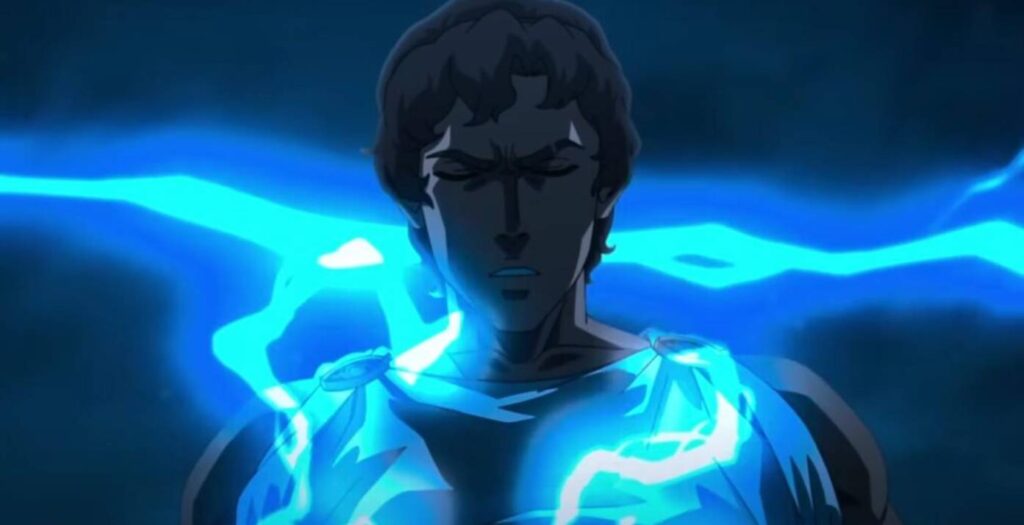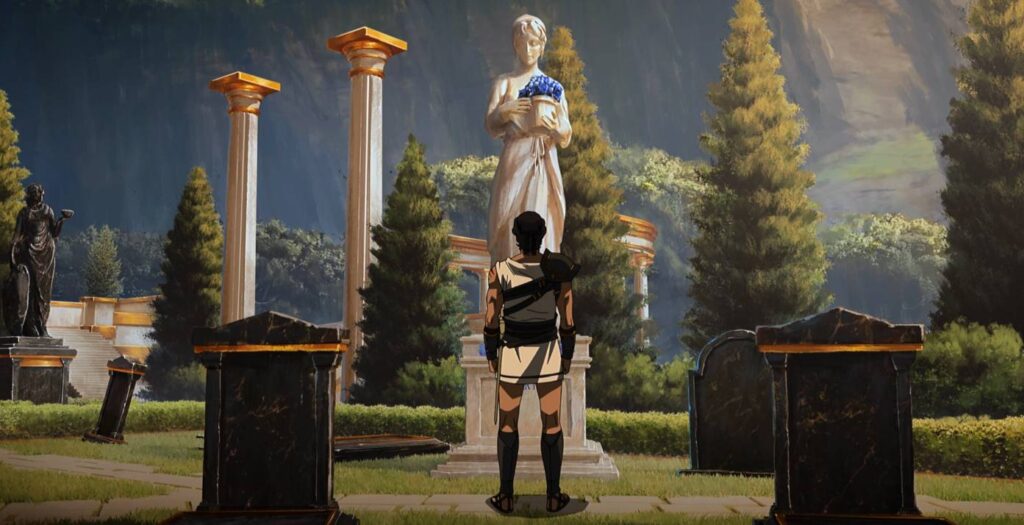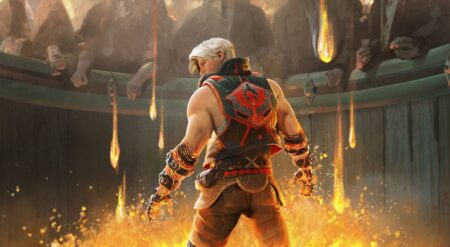This interview has been edited for length and contains spoilers for Blood of Zeus Season 2. Click here to listen to the full 45-minute interview with Charley and Vlas Parlapanides.
Blood of Zeus Season 2 was second only to The Queen’s Gambit when it was released. Another one of Powerhouse Animation Studio’s adult animated series, the Netflix Original, was a critical success, and after almost four years, it’s back with a second season that doubles down on everything that made the first one a hit. With even more character dynamics that investigate justice beyond just good and evil, this season is propelled by love in all of its iterations. We spoke with creators and co-showrunners Charley and Vlas Parlapanides about their return in Season 2, bringing Greek myth to life and showcasing character complexities in every god and human they put on screen.
To kick things off, we discussed how it felt to be back after such a long absence. Charley Parlapanides kicked off the interview emphatically, “We’re so glad that it’s finally here! We feel bad. We apologize to the fans. Unfortunately, we’re almost like the Olympics, where we come around every four years; it’s been three years. COVID may seem like it was a very long time ago. But a lot of this was caused by the fact that when COVID hit all the live-action production shut down, and everyone was doing animation. And so when we finally got the order, there were no studios to handle the overseas animation.”
He continued, “Literally, we finished the scripts in June of 2021, and we didn’t find a studio that could take on the work until 2022. I spent a whole year there because everyone was doing animation. That was the only thing going on. So, we feel people’s frustrations, but we’re excited that they can finally continue this journey.
Vlas Paralapanides added to Charley’s apology but also teased what can happen if Blood of Zeus Season 2 is as successful as the first. He said, “We want everyone, God willing, to return and to watch because something we can share with you is that if we do get enough views, Netflix will Greenlight our Medusa show. It’s a Medusa story where she’s actually the hero. In the very short elevator pitch, it’s Wicked, but with Medusa. She has the power to become the Gorgon to get revenge and get justice, not as a punishment.”
For all of its time away, Blood of Zeus Season 2 comes out taking big swings. Where Blood of Zeus Season 1 is about anger and retribution, the series’s second season is all about love and justice. The characters are moved by their love for others, but it’s also the one element that morphs them toward harming others.

For Seraphim, we see him engage with his past, balancing the scales to save the love of his life from Tartarus. For Heron, he uses what little time he has to do good in order to make up for the intense guilt he feels toward pushing Zeus’ lineage away and causing his mother’s death. Hades and Persephone reach for power to reunite their family. And Hera stands on a foundation of justice that showcases how much she loves her husband in spite of the harm he’s caused her. All of those moving pieces come together to create something special.
Love balances tragedy, and the scale of justice reigns supreme in Blood of Zeus Season 2. With two large sequences as characters stand to be judged by the kings of the Underworld, good and evil are painted in shades of grey. It’s a concept that Charley and Vlas Paralapanides dove into when we spoke with them.
Charley began, “We’re just so lucky that this is such an incredible sandbox. In the ancient myths, they talk about how if a hero or a villain [had people] pay tribute to them, and [they] prayed for them, [the person] could move through the five realms of the underworld. You could almost level up or level down if [someone] did good in their name or bad in their name. The idea is that all is revealed, you will be judged, but then you could repent. Apollo says it very briefly, [something like] we’re going to do good in other people’s names. We’ll build temples and make sacrifices. We’ll do good deeds that can help them in the underworld…”
Vlas added, “There’s good, there’s evil, but then there’s justice. And I think people, overall, recognize when something is just and when something is unjust. In between those two things, there’s a lot of gray. Justice, I think, is something that can be a North Star for pretty much everyone. Getting to that place just requires time, and it has to also be earned. It has to come about in an organic way… It’s not one single deed that leads to justice. It is a combination of things… That’s why Zeus was sentenced to Tartarus. You [have] to look at his life in the collective.”
With more shades of grey coloring the characters in the series, Blood of Zeus Season 2 pushes the audience to build empathetic connections with all of them. Not one antagonist is wholly wrong or wholly right. But all of that comes from the mythology itself. Charley explained, “[Justice] is something that they stressed in ancient Greek culture and mythology; if you look at Hesiod, he talks about the five ages. You have the Bronze, Silver, and Gold—that’s where they got it for the Olympics— and then you have the Iron. Then you have the Age of Heroes, which emphasizes doing great things and doing honorable things. Do things that would echo out and give glory to your name [and] to your people in your city-state. The idea is that there is a more right path than some [other] paths.”
But on the path to justice, where does redemption lie? Specifically for a character like Seraphim, who has moved from a villain to a co-lead of the series in Blood of Zeus Season 2. How do you build empathy and justice without giving a character a redemption arc that forgives everything in one swoop? Well, they have answers.
Charley started the conversation, “This is funny because we have this conversation with Elias Toufexis—who voices him. Seraphim chooses to be tortured rather than be beholden to a God again. [But he allies himself with a god again]. It’s almost like what he did with Hera [in season one]. Seraphim is tired of this, but he’ll begrudgingly go along with Hades because he sees that he can get something out of it to do something he wants. We didn’t want to [redeem him] all of a sudden just because people liked him and he was a beloved character. [We didn’t want him to] all of a sudden be a hero. He’s still working through everything he’s been through.”
By referencing Seraphim’s refusal to repent, Charley and Vlas note the complex nature of his arc. He’s growing, but he is still the same character. Charley continued, “Even when facing judgment, [Seraphim is] stubborn—that’s what we love about Seraphim. That stuff is where the character just leads you.” Even under threat of torture, Seraphim is unyielding. He can’t undo the past, and he won’t even try.

Vlas adds, “Just speak to Seraphim—with regards to that trial scene—that is the character. It’s always balancing, ‘This is the character’ and ‘We want to show growth.’ So, we’re going to show growth, but it has to be earned. And the audience has to understand if he’s going to deviate from past behavior, [they have to know] how he got to that new place. We have a trajectory for Seraphim, where he is going to grow, but he still needs to ring true, and he needs to grow in his way.”
But where Seraphim is moving forward, Heron is stuck. Charley explained, “The fact that Seraphim is just looking forward now, he has a kind of tunnel vision. He thinks, ‘I’m going to do this for this person that I loved, and try and redeem her. That’s all I care about. Everything else? Forget it.’ And Heron can’t move forward. He’s torn up and lost. He’s kind of the quintessential outsider. He doesn’t feel welcome in Olympus, and it doesn’t really make sense for him to go back into the [human] world. He’s [not fully] a god and is not fully human, so he doesn’t fit in either sphere.
Charley adds, “In some ways, how is [Heron] going to find peace? In a lot of ways, with all of the things that are revealed to him in the first two seasons, it’s all just tumultuous and drama. [He] just wants to do the right thing and be done. I always think of him as Captain Winters in Band of Brothers. ‘If I survive all this, I just want to find a quiet farm and be left alone. Go the world without war.’ That’s where Heron wants to end up.”
To add to this, Vlas touches on the guilt that haunts Heron in Blood of Zeus Season 2 and how it keeps him stuck. “Heron is haunted by things that he’s done in his past,” he said, “When he threw away [Zeus’] sword, it really haunts him because if he had had that sword, he could have averted everything. Zeus would still be alive, and thousands of other people would still be alive.”
But Blood of Zeus Season 2 also adds a complication: someone has cut his thread of fate. This means that the entire season, he is moving forward knowing that his death is near. Vlas explains, “Heron knows that he’s about to die. So he has a period of time where he’s going to live, and he hopes that he can do enough good and can undo the things that he did in the past. That definitely drives him. He has more awareness of his brother, [Seraphim], because now he’s dealing with a great power that scares him at times.

“It is very true [that] power corrupts, and absolute power corrupts absolutely. And the allure of that power, the draw of that power, that’s something that he’s really starting to feel now in [Blood of Zeus Season 2]. And so, then he makes the connection, ‘My brother, he had felt that when he ate of the giants. He was endowed with his power,’ and Heron begins to understand how hard it is to let that power go.”
Vlas continued, “[Heron and Seraphim] both share a fear-based kind of reaction. If you’re powerful and you’re strong, you’re going to be okay… They both have experienced so much trauma. If you have all this power, you’re not going to be that young boy who got his eye cut out or hiding from villagers in the trees. The way you really eliminate fear is to be able to become all-powerful and sit on top of the throne.”
While Seraphim and Heron represent new additions to Greek mythology as original characters, picking up a legacy means something special to the two Greek brothers—especially when they look back on what the stories have meant to them throughout their lives and the reaction of people in Greece to Blood of Zeus.
We asked the brothers how it felt to be adding to the Greek tradition of retelling these myths, and Charley responded first, “We just stand on the shoulders of our ancestors.” He continued, “We just feel so lucky. We just try and honor [our ancestors]. We always say that this isn’t our story; this is Greece’s story… There’s a lot of pride, especially when we speak to Greek reporters or our wives’ cousins in Greece [and hear] ‘We love the show!’ That makes you feel good, especially because [Greece] has gone through such a hard time [in] the past decade. They’re very proud when they see our stories out there and doing well on Netflix. So, for us, it’s a source of great pride… As much as we love the show, the fact that the Greeks are proud of it is probably the greatest reward for us.”
Vlas added, “We’re very proud. And just to piggyback off what Charley said, we did a bunch of interviews with Greek reporters, and they were sharing with us just how much it meant to them to have a Greek animated show do so well, during that period of time. I remember this was almost four years ago, I hate to say that. At that time, Greece was really struggling, and then here came this show that did two things. One: It made them very proud. Because we were number one in over 40 countries, and that was really cool. We were number two in the US, only behind The Queen’s Gambit, which was a juggernaut. And two: it also gave them something to watch that made them forget about their problems for a little while. We felt like we did right by them and that made us feel good.”
Blood of Zeus Season 2 is streaming now exclusively on Netflix.







